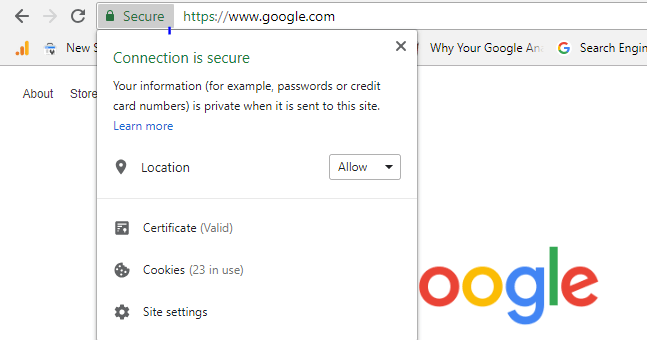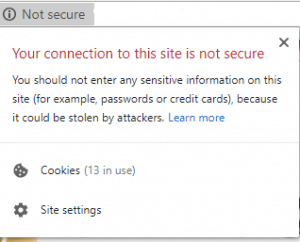Google’s latest release of Chrome will make it more apparent when sites are not secure.
Google Chrome has become the browser of choice for most Internet users, increasing Google’s ability to manipulate the way the web is utilized by creators and consumers alike. Over the past few years, Google has been encouraging sites to migrate from HTTP connections to HTTPS secure connections. The purpose of HTTPS is to encrypt the connection between yourself and a website, preventing others from accessing your data or impersonating the site.
A Small Change with an Important Meaning
In 2017, Google looked to reward sites that made the switch to HTTPS by displaying a green lock next to the word ‘Secure’ preceding the URL of a secure site. Google’s change to be seen in September 2018 with the release of Chrome Version 69 will be a warning icon next to sites that are not secure. Furthermore, Google will no longer praise websites for their secure connection as they will remove the lock icon and “Secure” label and replace it with a standard black icon. The underlying message from Google as iterated by these actions: Security and encryption should be the norm; we’ll let you know if the website you’re attempting to access does not meet our standards.
Currently, site information is presented as follows:


How do “Secure” HTTPS Websites Work?
Site encryption was originally only considered necessary for websites that collect personal information. HTTPS connections were reserved for banks and other sensitive websites, and one would be redirected to an HTTPS page for signing into websites that required a password or credit card information. Google’s increasingly arduous preference of HTTPS connections for all websites is rooted in their predilection for a faster web browsing experience with improved security and privacy.
HTTPS stands for “Hyper Text Transfer Protocol Secure.” The addition of “S” to HTTP indicates that HTTPS websites are set up to use SSL encryption. SSL encryption ensures that the information and data packets being sent from your device to website servers cannot be intercepted nor altered. SSL encryption also prevents malicious impersonation of a website. When you connect to a HTTPS website, Google’s servers provide a security certificate that is valid for that website only. This prevents malicious Wi-Fi hotspots from directing you to an imposter site that is designed to steal your password, credit card information, etc. SSL provides a privacy advantage in that no one, not even your ISP, can see the full path of webpages you visit whilst connected to a secure site. For instance, if you visit Wikipedia or the Wall Street Journal online, your ISP will only be provided with the information that you are accessing these websites, but not what you are reading about.
Why is this Important and What Do I Need to Do?
According to Google:
- HTTPS protects the integrity of your website.
- HTTPS protects the privacy and security of your users.
- HTTPS is the future of web.
Google announced in 2014 that HTTPS would be used as a ranking signal for SEO. This means that secure websites may have a greater chance of visibility in SERPs than non-secure sites. There are several other factors that affect search rankings, but it has been confirmed that HTTPS may serve as a tie-breaker between two search results that are relatively equal regarding other ranking factors. From a less technical standpoint, it can be surmised that users would rather click through to a website where they feel that their personal data and information will remain private. This reason alone provides sufficient rationale for switching your website to HTTPS, as a superior user experience is key to customer retention.
As a Google All-Star Agency, Titan Growth leverages innovative strategies, leading-edge best practices, and up-to-date industry research and knowledge to provide a customized growth plan for our client’s websites. Our team of experts has handled countless site migrations to HTTPS and is aptly equipped to apply our expertise, ensuring our client’s websites are optimized for Google’s algorithms and tailored for an exemplary user experience. Feel free to contact us for a complimentary consultation that will include real data on your website and its competition, opportunities to increase revenue, and a glimpse at our proprietary TitanBOT technology, as we crawl your website to find coding issues, growth opportunities, and more.


